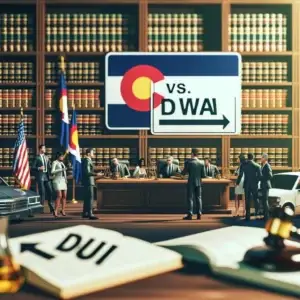Physical confrontations can happen in an instant. A heated argument, alcohol, drugs, or even a misunderstanding can escalate quickly into violence. When charges result, one of the most common defenses in Colorado is self-defense.
At its core, self-defense is an affirmative defense under Colorado law. This means a defendant may admit to the underlying conduct but argue it was legally justified. While the concept may seem simple — you have the right to defend yourself — in practice, Colorado’s self-defense law is complicated, fact-dependent, and often hotly contested in court.
What Is Self-Defense Under Colorado Law?
The right to defend yourself is codified in C.R.S. 18-1-704, which defines the justifiable use of force. To claim self-defense, two key elements must be shown:
Imminent threat of unlawful force – The defendant reasonably believed they were about to be attacked. This can include both actual assaults and threats of force that would cause a reasonable person to fear harm.
Proportional response – The defendant used only the amount of force necessary to stop the threat. Deadly force can only be used against deadly force.
If proven, self-defense makes conduct that would otherwise be a crime legally justified. However, this defense is not unlimited, and courts impose important restrictions.
The Initial Aggressor Rule in Colorado
One of the most critical limits on self-defense in Colorado is the initial aggressor rule. A person who starts a fight cannot later claim self-defense unless they clearly withdraw and the other party continues the confrontation.
Colorado’s jury instructions on self-defense explain that:
A defendant cannot rely on self-defense if they were the initial aggressor.
An initial aggressor can regain the right to self-defense only if they retreat or withdraw, and the other person pursues the attack.
The statute does not define “initial aggressor,” which leaves room for interpretation. Jurors must apply a common-sense understanding of the term, and attorneys often argue about what it means.
Factors Jurors Consider in Determining an Initial Aggressor
Who made threats first.
Who physically escalated the situation.
Whether alcohol or drugs played a role.
The motive or reason behind the confrontation.
The nature and location of injuries.
Whether one person appeared defensive while the other acted offensively.
Because fights unfold quickly, piecing together the sequence of events is rarely straightforward. Police reports, body-worn camera footage, medical records, and witness testimony all become central to deciding whether a defendant was acting lawfully in self-defense.
Why Self-Defense Cases Are Complicated
On paper, self-defense seems simple: you can protect yourself if attacked. In practice, Colorado courts look at the totality of the circumstances — everything that happened before, during, and after the confrontation.
For example:
A shove during a heated argument might not justify responding with deadly force.
If someone makes threatening gestures but never throws a punch, the question becomes whether the defendant’s belief of danger was reasonable.
If both parties are injured, jurors may have to decide who was defending and who was attacking.
These fact-specific determinations make self-defense trials in Colorado some of the most challenging criminal cases to litigate.
Self-Defense in Domestic Violence Cases
Self-defense frequently arises in domestic violence cases in Colorado. Unlike fights between strangers, these cases involve people with intimate or family relationships. That changes the dynamics significantly.
Different motives: Allegations of jealousy, custody disputes, or long-standing relationship issues can influence how jurors view credibility.
Prior acts: Normally, Colorado Rules of Evidence exclude “prior bad acts.” But in domestic cases, past conduct can sometimes be introduced to show motive, scheme, or intent.
Reasonableness of fear: Prior incidents of violence may help explain why a defendant reasonably believed an attack was imminent.
Because of these complexities, having a domestic violence defense attorney in Colorado who understands self-defense law is crucial. The wrong approach can leave a jury with only one side of the story.
Self-Defense and the Use of Deadly Force
Colorado law permits deadly force only in limited circumstances. A person may respond with deadly force if they reasonably believe:
They are in imminent danger of being killed or suffering serious bodily injury.
The aggressor is committing a burglary, robbery, kidnapping, or sexual assault.
However, using deadly force against non-deadly force (for example, shooting someone after being pushed) is not justified. Jurors are carefully instructed to weigh whether the level of force was appropriate.
Strategies in Self-Defense Cases
Every self-defense case is unique, but common defense strategies include:
Challenging the aggressor label – Arguing the defendant was not the initial aggressor, or that they withdrew and were still pursued.
Highlighting reasonableness – Demonstrating that a reasonable person in the defendant’s situation would have believed an attack was imminent.
Using expert testimony – In some cases, experts on human behavior, intoxication, or injuries can explain why a defendant acted as they did.
Introducing context – Bringing in evidence of threats, prior violent behavior by the other party, or environmental factors (such as being cornered).
Because the outcome often depends on jury perception, crafting a clear and compelling narrative is critical.
Self-Defense and Alcohol or Drug Use
Substance use often complicates self-defense claims. Jurors may question whether a defendant’s belief of imminent harm was reasonable if they were intoxicated. At the same time, alcohol or drugs frequently contribute to fights in the first place.
Attorneys must carefully navigate these issues, sometimes by bringing in toxicology reports, expert witnesses, or video evidence to support the defendant’s account.
Local Application of Self-Defense Law
Colorado courts handle self-defense defenses differently depending on the county:
Denver County: Jurors often see a high volume of assault and domestic violence cases, making them more familiar with self-defense claims.
Arapahoe County: Judges emphasize jury instructions about the initial aggressor rule.
Jefferson County: Prosecutors are known to challenge self-defense claims aggressively, particularly in domestic disputes.
Working with a Colorado criminal defense attorney who understands local court practices can make a significant difference in case strategy.
Why You Need a Self-Defense Attorney
Attempting to handle a self-defense case without legal representation is risky. Prosecutors will argue you were the aggressor or that your use of force was unreasonable. Without an attorney to present evidence, cross-examine witnesses, and explain the law, a jury may never hear the full story.
An experienced self-defense lawyer in Colorado can:
Evaluate whether self-defense applies to your case.
File motions to suppress prejudicial evidence.
Develop trial strategies tailored to the facts.
Negotiate with prosecutors when trial is not in your best interest.
Key Takeaways
Self-defense in Colorado is an affirmative defense that justifies conduct that would otherwise be criminal.
The initial aggressor rule limits who can claim self-defense.
The law requires force to be proportional to the threat.
Domestic violence cases add unique complications due to prior relationship history.
Each case is highly fact-dependent, making skilled legal representation essential.
Get a Free Consultation With a Colorado Criminal Defense Lawyer
If you are facing charges involving a fight, domestic dispute, or other physical confrontation, you may have a valid claim of self-defense. But presenting that defense effectively requires experience, strategy, and an understanding of Colorado jury instructions.
The Lawrence Law Firm defends clients in Denver, Aurora, Arapahoe County, Adams County, Jefferson County, and Douglas County. We provide free consultations and flat-fee agreements, with evening and weekend availability when needed.
Call today to speak with a Colorado criminal defense attorney about your case and learn how to protect your future.






